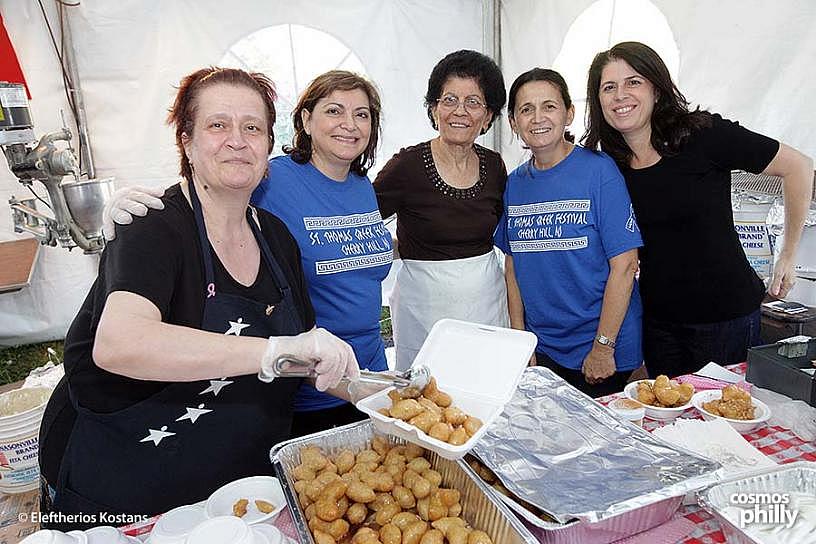We all grew up with them – the Greek festival. Each year the Greek-American communities bring out their gyros, baklava, and say Opa, to raise money for their churches. But has the Greek festival become passé or unimportant? Has it become too costly? Is it time for the Greeks to get out of the Greek festival business and start developing some other sound financial projects for our churches to sustain themselves for the next 25… 50… 100 years? Can we continually depend on selling those little succulent morsels of marinated meat known as souvlakia, to support our churches, the cost of which is skyrocketing like everything else? Can’t we come up with a better way to make money?
I know what you’re thinking. Is he out of his mind? Does he have loukoumades for brains? Hear me out.
Think about it. Once a year (sometimes twice a year) most of our churches hold a Greek festival. Preparation usually starts months in advance. First problem… the chairperson. Who will take that thankless and unappreciated job of goading or forcing your friends, families, and fellow parishioners into volunteering for just one more year and then listening to the bickering of those volunteers about everything, or going out begging for donations from the local businesses, or making sure there are enough of everything to go around, and, in the end, hoping it doesn’t rain. It takes a special person (and a hard exterior) to volunteer to be the chairperson of a festival. I never did it – it’s too dangerous.
Second problem… the weather. If you’re holding an outdoor festival, you are subject to the whims of the Ancient Greek gods of weather. No matter how many gyros we sacrifice to them, it can be too cold or too hot, a downpour or a sickening constant drizzle… even snow! The festival was for 4 days… it rained 3. All that preparation down the preverbal tube– it was a Greek tragedy. There are tents… very expensive tents, but if the people don’t come out because of the rain… the tents are worthless.
Third problem… volunteers. How many times are we going to ask Kiria Katina and her elderly friends to make their spanakopita with “rolled-out” filo dough? They work all week at the festival and then can’t get out of bed the Monday after the festival and it always seems that it is the same people working all of the time!
Fourth problem… the cost. The cost of the main ingredients of a festival keeps climbing. Meat for the souvlakia, tomatoes and Feta cheese for the Greek salad, oil to cook, tents, security, advertisement, entertainment… the prices are rising. Back in the 90’s a gyro sandwich was $3.50. Today, $8.00. Pastitsio platter… $15.00. Where does it all stop! How many times are we going to ask those special people that come to support our festival to put out another few dollars for that piece of baklava that gets smaller each year? If the festival has rides and games for the kids… I don’t even want to go there with the price of amusement ride tickets!
So do we really need to break our backs, tempt fate, and hold these Greek festivals? Of course – what did you think I would say?
The Greek festival is as American as Mom’s Apple Pie. It is the reason our fellow Americans now know what a gyro is and most say it the right way with a soft “g”. The Greek festival showcases our Greek culture and heritage through folk dancing, tours of our Greek Orthodox churches, our unique bouzouki music, and of course our Greek food – especially with our reputation of being great cooks.
People look forward to Greek festivals. Our “American” friends are always asking when it is and they go once, twice, or three times during the festival. If there is live entertainment, they are usually out there trying to mimic the dance steps… all in good fun.
Is the Greek festival the best way to keep our churches financially afloat… no, but it’s an easy way and we love it. Those volunteers that work each year might complain but most of them are the first to arrive to work at the festival, and, even though Kiria Katina and her friends might not get up easy on Monday morning… they have a big smile on their faces because they were with their friends and families, especially their grandchildren, working the days of the festival. It gives them purpose. We see friends that we may not have seen for the past year or years. We see our neighbors that live only a few doors down but we don’t really talk with them. Sometimes it is just not about the money.
Last year during the mini-festival at St. Demetrios in Upper Darby, Pennsylvania, I even flipped the souvlakia. I think I was the main attraction because the community was not use to seeing me with tongs in hand over a hot grill. They laughed, but I had a great time. Me and my fellow volunteers talked and talked and talked about everything and nothing… the upcoming election, philosophy, music, business… Greek politics (we worked out their current financial situation, why can’t they?) you name it. We started out with a little krasi, then some beer, and a little Ouzo, and by Sunday night, we broke out the bouzouki and the guys sang, or tried to sing, and danced.
Yes, the Greek festival brings the community together. It’s not just about making money but it’s what we Greeks and Americans of Greek descent try to do best… enjoy life and share that enjoyment with others. And God bless those chairmen and all the volunteers! Opa and see you at the next festival!



